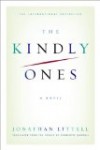A 975-page novel probably isn’t the best for the first “microreview,” especially one as widely praised and condemned as Jonathan Littell’s The Kindly Ones.
 The book won two of France’s highest literary awards before being translated into English — although it is written by an American. It is the fictional, but exceptionally well researched, memoir of Max Aue, a Nazi SS officer who survived the war and remains unapologetic about National Socialism, its aims and his involvement in what became known as the Holocaust. When you combine Aue’s lack of guilt with his incest, scatological references, brutal homosexual encounters and possible murder of his mother and stepfather, this is not a pleasant read. Still, it is an unquestionably intriguing and unvarnished exploration of the psychology — or abnormal psychology — of Nazism’s true believers.
The book won two of France’s highest literary awards before being translated into English — although it is written by an American. It is the fictional, but exceptionally well researched, memoir of Max Aue, a Nazi SS officer who survived the war and remains unapologetic about National Socialism, its aims and his involvement in what became known as the Holocaust. When you combine Aue’s lack of guilt with his incest, scatological references, brutal homosexual encounters and possible murder of his mother and stepfather, this is not a pleasant read. Still, it is an unquestionably intriguing and unvarnished exploration of the psychology — or abnormal psychology — of Nazism’s true believers.
The readability of the work is not helped by its typography. Littell uses a quotation style with which Americans are unfamiliar, he loves commas and he avoids paragraph breaks. Thus, many paragraphs in the book’s seven chapters, all named for 17th Century dances, can run on for two or more pages. Substantively, The Kindly Ones can be criticized as at times far-fetched given Aue’s somewhat miraculous escapes from death and his personal contact with a true rogue’s gallery — Himmler, Heydrich, Speer, Eichmann and even, in a somewhat ludicrous scene, Hitler. But Littell’s focus isn’t necessarily external events or history. He tries to look much deeper, to take us inside how seemingly ordinary men committed such horrendous acts. He forces us to examine the question of evil in man, whether banal or otherwise. These are inherently unpleasant inquiries.
Littell sometimes lets Aue expound on history, philosophy and the arts at perhaps too much length. That said, the unique, albeit disturbing, perspective The Kindly Ones gives on some of history’s greatest atrocities makes it a book that can and should be considered an “important” work of fiction.
I do not regret anything: I did my work, that’s all[.]
Jonathan Littell, The Kindly Ones.







